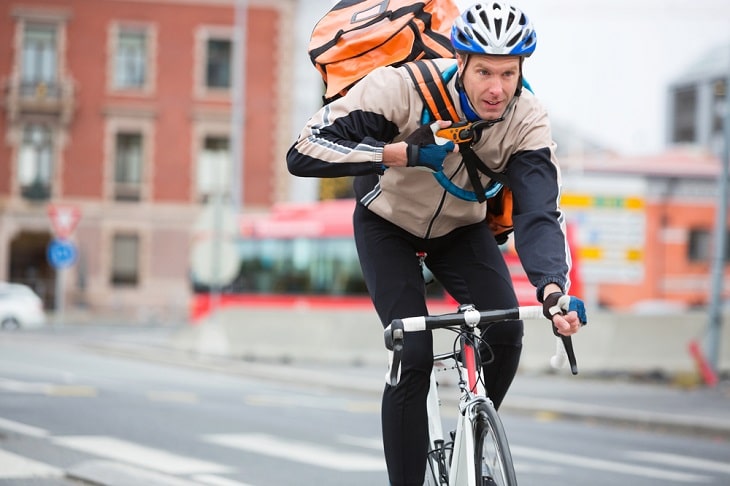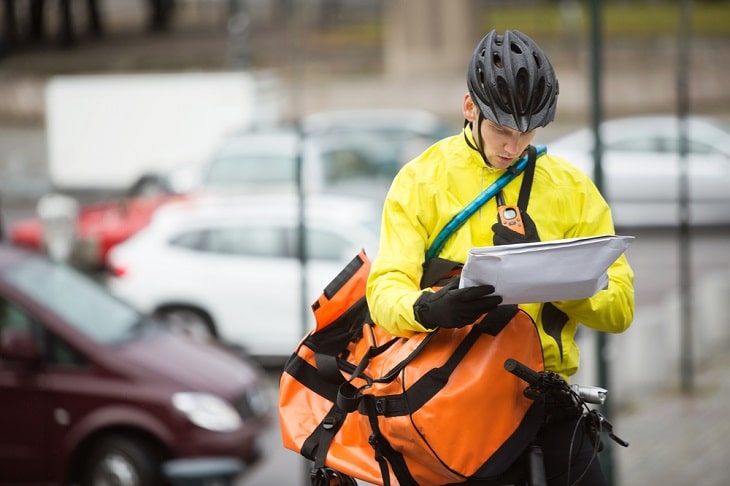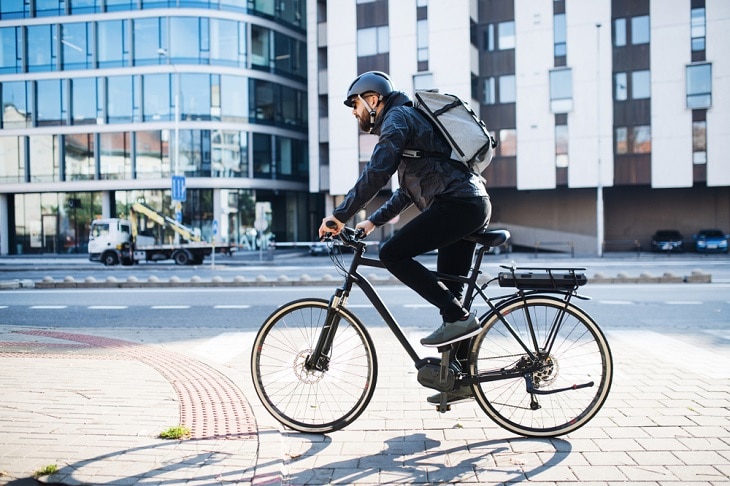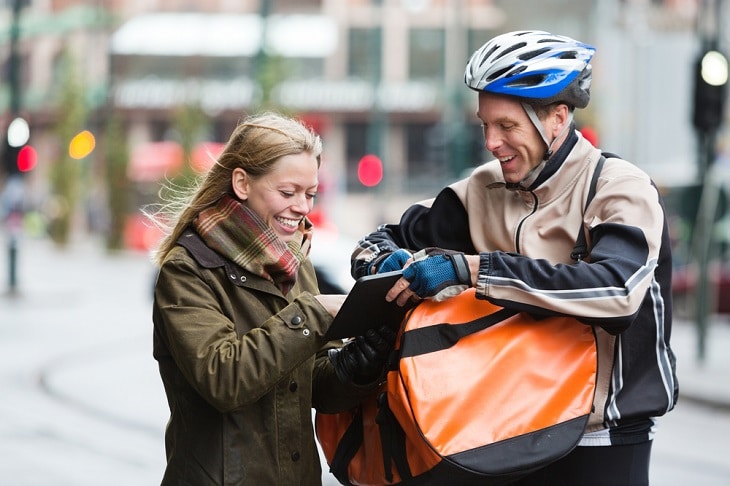Jasmine Birtles
Your money-making expert. Financial journalist, TV and radio personality.


If you enjoy being outside and want to earn money whilst getting fit, bicycle couriering could be the job for you.
There are lots of reasons for becoming a bike courier: flexible working hours, good earning potential, it’s great exercise, and your are helping to tackle climate change with every pedal.
There are plenty of reasons why bike couriers are in such high demand too. In a place as busy as London (where the average speed for cars is less than 10mph), cyclists can go at more than 15mph and are a useful means of transport.
Read on to learn how you can earn money as a bicycle courier — it really is as easy as riding a bike!

Whether it’s delivering important documents between offices or Thai food to hungry customers, there is a lot of work out there for bike couriers.
If you are delivering things like light packages, urgent documents and other small bits between offices and other businesses, the jobs are typically office hours.
The usual radius for this kind of courier company is about two miles, although larger firms operate numerous riders in a wider area and some work nationally.
Register with companies like Stuart and Street Stream to become a bike messenger.
In the last couple of years, companies like Deliveroo, UberEats, and Just Eat have revolutionised food delivery.
Providing fast food delivery around the clock, often from places that wouldn’t normally deliver, these companies use bike riders to bypass city traffic so customers get their food fast.
Riders can choose from a wide range of working hours when working for these companies and demand is high, especially in heavily-populated urban areas.
Riders typically accept a job on their smartphone and and set off to pick the package up and deliver it on time. And of course, you need to follow the rules of the road, to stay safe and show you’re reliable.
What then? Keep checking the app for the next job, of course.
All bicycle couriers are self-employed, which means you’re responsible for the ‘tools of your trade’, as well as paying your own tax and national insurance.

First of all, you need a bike. Some companies will provide you with one of their own fleet if their image is important to them, but most just require you to have a bicycle that allows you to get around quickly and reliably.
If you haven’t yet got a bike, check out our Bicycle Buying article on what to look for, including the latest offers from Evans Cycles and Halfords.
You also need all the kit that goes with it – a pump, a puncture kit, spare tubes and tyre flips for repairs. A messenger bag made from durable material and waterproofing is also essential, as are straps to attach your two-way radio to the bag.
A map of the area you’re working in, such as an A-Z, will help you get where you need to using the best route. The next tool you need is a mobile phone. Make sure you are on a good contract that offers you a large amount of free calls per month. To help you work out tax claims, it might be easier to have a separate phone for business use. . Find the best mobile phone contract with MoneyMagpie.
A computer is also good to have, though not an absolute necessity. It can help with things like account keeping if you don’t want to use a ledger book.
Although it’s still not a legal requirement to wear a helmet on the streets, there’s increasing evidence that proper fitting helmets can reduce the number and severity of head injuries. The most basic helmets start from under a tenner and a more sophisticated one can cost £50 or more.
If you’re out after dusk, you’re required to have lights fitted to your bike – so ensure you add these to the cost of your bike. A set of front and back lights starts from £14.99 at Evans Cycles.
It’s also a good idea to invest in a fluorescent vest and fluorescent stickers for your helmet.
Even if you have a garage to store your bike in at home, you’ll need to think about where you’ll leave it when you get to your destination. If you don’t want your bike stolen, a lock really is essential, it’s also a good idea to make sure you lock up at least one, if not both of the wheels. You can get the basics from Halfords, beginning at £5.99.
Women’s saddles are slightly wider and shorter than men’s, and can add to the comfort of riding long distances. Gel padded saddles are better for short trips. Amazon has a great selection of gel pads to keep those tushies comfy.
As with most self-employed jobs, insurance is important. You should cover yourself, your bike and the goods that you’re carrying for others.
Bicycle insurance can be really cheap, and with a bike stolen every 90 seconds in the UK it’s definitely worth taking out a policy.
Your bicycle may be automatically insured under your existing home contents policy. Alternatively you may be able to extend the cover you already have to include your bike for an additional premium.
This might work out cheaper than buying a separate policy just for the bike. However, specialist bicycle insurance will include much better cover. Find the best bike insurance for you.
Deliveroo offers free insurance to its riders which covers third party liability, medical treatment, and loss of earnings due to work-related injury.
Goods in Transit insurance is also a must-have and protects you in case you damage your customers’ goods. Cover generally goes up to £10,000 as standard, but can be arranged at a higher level if you find yourself carrying very valuable goods.
Public liability insurance is optional, but you may prefer to have it as it will cover you for things like dropping a heavy box on a client’s foot or other people-related accidents.
As already mentioned, all bicycle couriers are effectively self-employed.
You can either do your own accounts, or hire an accountant. It’s a good idea to speak to an accountant first, even if only to question them on what exactly you can claim back on your tax return.
This will be things like your mobile bill for business purposes, safety gear and other work-related costs.
You can even claim mileage expenses with HMRC – cyclists are allowed to claim 20p per mile each tax year (the tax office will want proof of your usage).
The best thing to do is get a notebook or expenses book and write down the date of the journey, the reason for that journey, the place visited and the mileage covered. Then you’re fully prepared with the details when it comes to making that claim.
Read the latest Government advice on how to set-up as a sole trader and manage your own tax bill.

You should get your first paycheck after a fortnight of working for your first company.
Riders have to have a 15 minute break every two hours, and should only work for a maximum of ten hours. And some companies have schemes which help particularly reliable couriers: If you’re very reliable and you work long hours, they’ll cover a percentage of your pay when work is quiet.
Bicycle couriers also have a code of conduct that must be followed, which is similar to the normal ‘rules of the road’ – don’t tailgate, don’t go the wrong way down one-way streets, don’t go through red lights and so on.
Have a look around at the various companies and don’t just go for the first one you come across. See where they deliver, what they pay and how they work.
Don’t go for a company where you have to put down a deposit. You could even trial a few in your spare time first, to get a feel for where you want to work.
Keeping daily records is essential for a courier. You may need to have a schedule of pick-up points and delivery addresses, or it could be a matter of constantly radioing in to get each new job.
Either way, you must keep a list of signatures to prove that you have dropped the packages off to your customers.
There are no formal qualifications needed, but you can take further development courses. Have a look at:
Starting salaries for couriers are around £14,500 a year, and can reach over £25,000.
Income can vary according to the number of hours worked and availability of work, but don’t accept anything less than £200 a week.
The bigger and better paying companies will pay up to £500 a week for the very experienced…which is only a matter of time, right?
Deliveroo claim on its website that their riders can earn up to £120 per day.
Being self-employed gives you the flexibility to choose when you want to work, but just remember if you don’t work, you don’t get paid!
René has been working for City Bike Couriers for the last four years and loves it. He describes bicycle couriers as ‘feral kids’ who get on their bikes, get the jobs and just do it. The day begins at 8.30am and can involve 30-40 drops during busy times, and as few as 12 drops a day when it’s quiet.
René retired from being a qualified chef and says couriering is easy compared to his old job. He says it does help if you’re fit – ‘you wouldn’t want to be a fat bastard’ – but at 45 years old he’s still peddling and says it’s great fun.
When asked about the safety aspect of the job, René believes there are far more dangerous things, even though every day he has trouble with cars. ‘People are all in their own little worlds and blind to everything…so you just don’t take stupid chances’.
He says the best thing about the job is definitely the flexibility. He was up in Ireland surfing and there were couriers up there who would do their jobs and then spend the rest of the day surfing.
The controllers do realise who is working where – so you shouldn’t slack off. But on the upside, the good couriers can chase the jobs they really want.

rene morgenroth should please get in contact with me as we havent had the chance to stay in contact after i left south africa in 1983
best greetings
Dirk